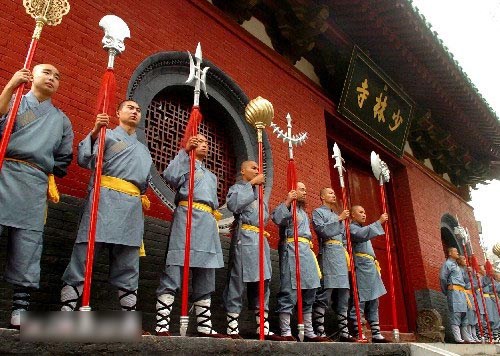Society
- Details
- By David Cao
- Hits: 814

A court in East China Wednesday handed down jail terms of up to three years to 11 people for their roles in writing and distributing viruses designated to steal usernames and passwords of online games.
Lv Yizhong and Zeng Yifu wrote Trojan horse viruses that were used to steal 5.3 million usernames and passwords of online games, found the Gulou District People's Court in Xuzhou city, Jiangsu province.
Yan Renhai, his girlfriend Chen Huiting and dozens other agents sold or used the viruses to steal online game coins and virtual equipment for illegal gains, the court said.
Lv and Zeng made 646,000 yuan ($94,597) in illegal gains, and Yan and Chen made 310,000 yuan.
Lv was sentenced to three years in jail and Zeng two and a half years. Yan was sentenced to two years and eight months and Chen, two years, in prison, according to the court.
The 11 also received a total fine of 833,000 yuan ($121,980).
A total of 80 people from 16 provinces and municipalities were involved in the 30-million-yuan case. Dozens others in the case are to receive court sentences in the near future.
- Details
- By David Cao
- Hits: 811

China has begun constructing a bridge to link southern Guangdong province, China's main manufacturing hub, with Hong Kong and Macau.
When completed by 2016, officials say it will be the world's "longest sea-crossing bridge" - spanning nearly 50km (30 miles).
One branch of the bridge will reach Zhuhai in Guangdong province.
Read more: China begins work on world's longest cross-sea bridge
- Details
- By David Cao
- Hits: 720
A remarkable 44% of Americans believe China is the world's leading economic power and only 27% think the U.S. is, according to a recent survey by the Pew Center. James Fallows, the Atlantic Monthly journalist, thinks that is proof that Americans have lost their minds. He argues that China can't be the world's leading economic power. Too many of its people live without indoor plumbing, no mainland science researcher has won a Nobel Prize and the country has no global brands. How can a place like that be an economic superpower?
The normally adroit Fallows surprisingly misses the real point. China already is a superpower in many regards. Despite its poverty, no matter what industry you're in or where in the world you operate, you can no longer ignore China's economic might. That is power.
Here are three trends to look for in 2010 that demonstrate China's superpower status:
First, China is wielding national influence in places it never affected before. Over the last several decades it provided an ideological counterpoint to the United States, doing business in its push for oil with unsavory regimes like Iran and Sudan that democracies traditionally wouldn't work with. Now China is gaining influence with America's closest allies, too. During the financial crisis it doled out billions in contracts in Great Britain and France. This year it surpassed the U.S. to become the largest trading partner of both Japan and Brazil. It conducts more than $100 billion a year in trade with both the Middle East and Africa. In Africa it is laying down highways and other infrastructure projects. Already 750,000 Chinese workers have moved there.
- Details
- By David Cao
- Hits: 782

A holding company that will manage the tourism-related assets of the Shaolin Temple is likely to seek public funds for expansion before 2011, the Shanghai-based Oriental Morning Post reported yesterday, without specifying where the firm would be listed.
The Dengfeng city government in Henan province, where the temple is located, recently signed a framework agreement with China Travel Service (HK) Ltd to invest 100 million yuan ($14.64 million) to establish the company under the Shaolin brand name, the newspaper said.
The planned venture is likely to raise 800 million to 1 billion yuan through various financing channels, including a public float before 2011, the newspaper reported.
The holding company will regulate the sale of admission tickets at the temple and also operate its cable car railway, movie theaters, hotels and tourist buses, according to the agreement.
The Hong Kong travel company will take a 51 percent stake in the venture while the Dengfeng government will own the rest, the paper said.
The temple itself was not involved in the negotiation process, the Oriental Morning Post reported, confirming the company plans from Dengfeng government officials.
"Abbot Shi Yongxin himself was not even aware of the deal until a few days ago and he knew nothing about the details of the negotiations," Qian Daliang, general manager of Henan Shaolin Temple Development Company, was quoted as saying by the newspaper.
Dubbed the "CEO monk", Shi Yongxin is a controversial figure, allegedly running the religious monastery in a business-oriented style.
Shi, 44, is the first Chinese Buddhist abbot with an MBA degree. He was criticized for allegedly accepting luxury gifts and constructing lavish restrooms worth $430,000 at the temple under his leadership.
Shi had said in an interview in August that the temple needed to realize the commercial value of its cultural heritage to support its development.
"The Shaolin Temple alone cannot support its everyday maintenance, the protection of historical relics and the life of our monks," Shi said. "So, we have to dig deep into the cultural value of the temple and to develop this culture industry."
The Shaolin Temple, the birthplace of Chinese kungfu and Zen Buddhism, has become a cash cow for the local government in recent years, fetching millions of yuan every year from tourism and commercial activity, including film production rights and an online store.
The temple, covering 30,000 sqm, drew 1.6 million tourists last year, generating 150 million yuan from the sale of entry tickets.
It also opened an online merchandise store - offering goods such as shoes, clothing, tea and kungfu manuals - on Taobao.com, China's biggest online retailer.
Industry experts said the likely share sale might boost the country's tourism sector as the government was encouraging the development of a consumption-driven economy.
Huangshan Tourism Development Co Ltd, a tourism company that runs businesses in the Huangshan Mountain area and Emei Shan Tourism Co Ltd, a Sichuan-based company that operates tourism resources on the Emei Mountain, are two travel companies that are currently listed in Shanghai and Shenzhen respectively.
- Details
- By David Cao
- Hits: 737
Just like Shanghai people enjoy being referred as Shanghainese, people in Beijing call themselves Beijingers.
But don't be so naive to think that because you have worked or lived in Beijing for several years, you are entitled to call yourself a Beijinger. The title of Beijinger belongs to those people who have Beijing registered residence permit, or hukou.
Registered residence permit represents a lot of things other than residency. Unless you are born with one, you have to work really hard in order to get one in Beijing.
Several days ago, I interviewed some black taxi drivers, those who don't work for any taxi companies and don't have permits to drive a taxi. Since these taxis are illegal and are relatively cheaper than official taxis, they are often accused of "stealing" customers.
However, asked about whether they would prefer to drive a legal taxi, most of the black taxi drivers said: "We can't. Only those with Beijing hukou get the right to work for taxi companies."
What's more, hukou is becoming a new criterion to testify if you have a relatively successful life in Beijing.
Two months ago when I proudly announced to my family and friends that I had been offered the perfect job in Beijing, the only question they asked me was "Does your employer offer you a Beijing hukou?"
After being told no, their disappointed faces made me believe that the job was not so perfect.
When it comes to relationships, Beijing hukou is definitely something you can brag about in front of your date. A man refused one of my best friends, a fantastic girl with a great job, over hukou. The man said: "Sorry, I only date those with Beijing hukou."
It's not because he is a Beijinger or dislikes anyone from outside of Beijing. He hoped to get a Beijing hukou by marrying a Beijinger. However, he has a long way to go before becoming an official Beijinger - he needs to stay married for at least 10 years before he gets hukou.
More Articles …
Page 186 of 255